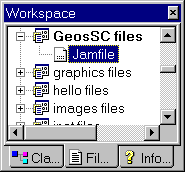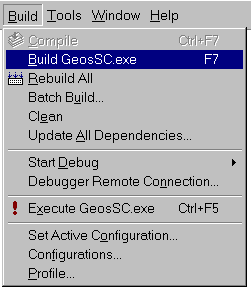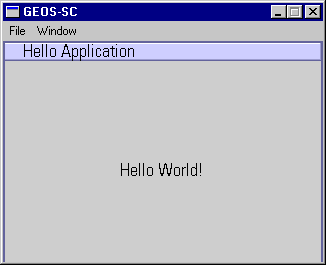Introduction | The Development Environment | Using an Existing Sample Application | Creating a Simple Application
The GEOS-SC SDK comes with several sample applications.
GEOS-SC is a single executable, GeosSC.exe.
GEOS-SC applications are modules (pieces of code) which can be
linked into the executable at build-time. By default, most
sample applications won't be linked in. To run
a sample application, you must
tell the development tools to compile and link it.
To compile and link a sample application:
GeosSC.exe executable.GeosSC.exe.![]()
![]() Load the GEOS-SC workspace (
Load the GEOS-SC workspace (GeosSC.dsw) by selecting GEOS-SC Workspace
from the GEOS-SC SDK program group in the Start menu.
![[Start menu screen image]](images/startDSW.gif)
Choosing GEOS-SC Workspace launches Microsoft Visual C++. You can also open this workspace in Microsoft Visual C++ by
choosing Open Workspace from the
File menu and selecting GeosSC.dsw.
![]()
![]() Include the sample application in the build by removing the
Include the sample application in the build by removing the ": Inactive" directive.
This tells the build program to compile and link the application
into GeosSC.exe in the next build.
jamfile.

Jamfile, look for the line referring to the
sample application, in this case hello.
Remove the ": Inactive" directive:
... Module appl samples graphics images : Inactive ; Module appl samples graphics logoapp : Inactive ; Module appl samples graphics stockgph : Inactive ; Module appl samples hello ; Module appl samples input inkinput : Inactive ; ... |
![]()
![]() To build the executable, select Build GeosSC.exe from the Build menu, or click on the
Build button.
To build the executable, select Build GeosSC.exe from the Build menu, or click on the
Build button. 

![]()
![]() To execute, select Execute GeosSC.exe from the Build menu, or
click on the Execute Program button.
To execute, select Execute GeosSC.exe from the Build menu, or
click on the Execute Program button. 
You may have linked in more than one sample application. To switch between applications in the emulator, press the F1 key and use the dialog box which appears.
Now you can see your sample application:

Introduction | The Development Environment | Using an Existing Sample Application | Creating a Simple Application